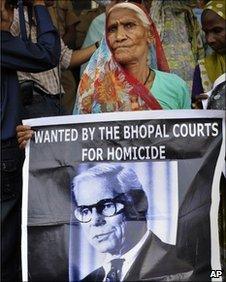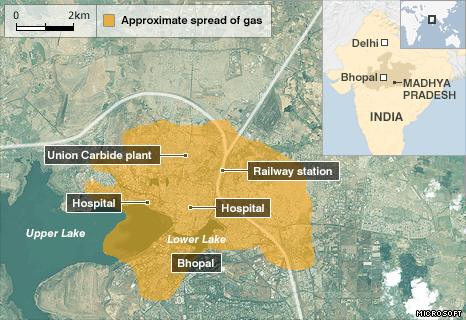Bhopal case still open for ex-chief Warren Anderson
- Published
India's law minister has said that the case against those responsible for the Bhopal gas leak in 1984 is not closed.
Veerappa Moily said that US citizen Warren Anderson, then CEO of Union Carbide, the plant owner, still faces charges for the disaster.
The comments come amid outrage by campaigners over convictions by Indian courts, which handed out two-year jail sentences to eight people.
A US official said he hoped the verdicts would bring "closure".
The leak at the Union Carbide plant in the Indian city of Bhopal is considered the world's worst industrial accident.
Official figures show at least 3,000 people died at the time and as many as 15,000 have died since.
Campaigners put the death toll as high as 25,000 and say the horrific effects of the gas continue to this day.
The convictions of the eight former plant employees, all Indian, were the first since the accident - with campaigners saying India dragged its heels over the case.
'Absconder'
Amnesty International described the sentences as "too little, too late".

Campaigners say they want Mr Anderson to stand trial
The BBC's Soutik Biswas in Delhi says an arrest warrant for Mr Anderson was issued by an Indian Court in 2003, but it was never acted upon.
Mr Anderson, who lives in New York, was not named in the verdicts after the Indian court described him an "absconder".
Mr Moily said: "As far as Anderson is concerned, the case is not closed.
"The CBI has filed chargesheet. The courts then frame charges.
"There is one person here that has not responded to the summons or replied to the charges. He has absconded and was declared a proclaimed offender," he told the Press Trust of India news agency.
It is not clear why India has not tried Mr Anderson - the only US citizen accused - in absentia, or sought to extradite him from the US.
'Closure'
Meanwhile, the US state department has refused to comment on Mr Anderson's possible extradition.
US Assistant Secretary of State for South Asia Robert Blake said he hoped the sentencing would "bring some closure to the victims and their families".
"I don't expect this verdict to reopen any new inquiries or anything like that. On the contrary, we hope that this is going to bring some closure," he said.
The eight Indians were convicted of "death by negligence". One was convicted posthumously, while the others are expected to appeal.
Satinath Sarangi, an activist campaigning on behalf of Bhopal victims, told the BBC that Mr Anderson and other US executives from Union Carbide should be brought to India to face justice.
"The charges that have been [laid] on the Indian accused have essentially been the charges that you would put for a traffic accident. This is indeed a very sad day for us."
'Unacceptable'
Amnesty International also called on the Indian and US governments to take legal action against US executives of Union Carbide.
"While the Indian employees have now been tried and convicted, the foreign accused have been able to evade justice simply by remaining abroad," said Audrey Gaughran, an Amnesty director.
In 1989, Union Carbide paid $470m (£282m) in compensation to the Indian government in an out-of-court settlement.
Dow Chemicals, which bought the company in 1999, says this settlement resolved all claims against the company.
In a statement released on Monday, the group said that "all the appropriate people from UCIL (Union Carbide India Limited) - officers and those who actually ran the plant on a daily basis - have appeared to face charges".

- Published7 June 2010